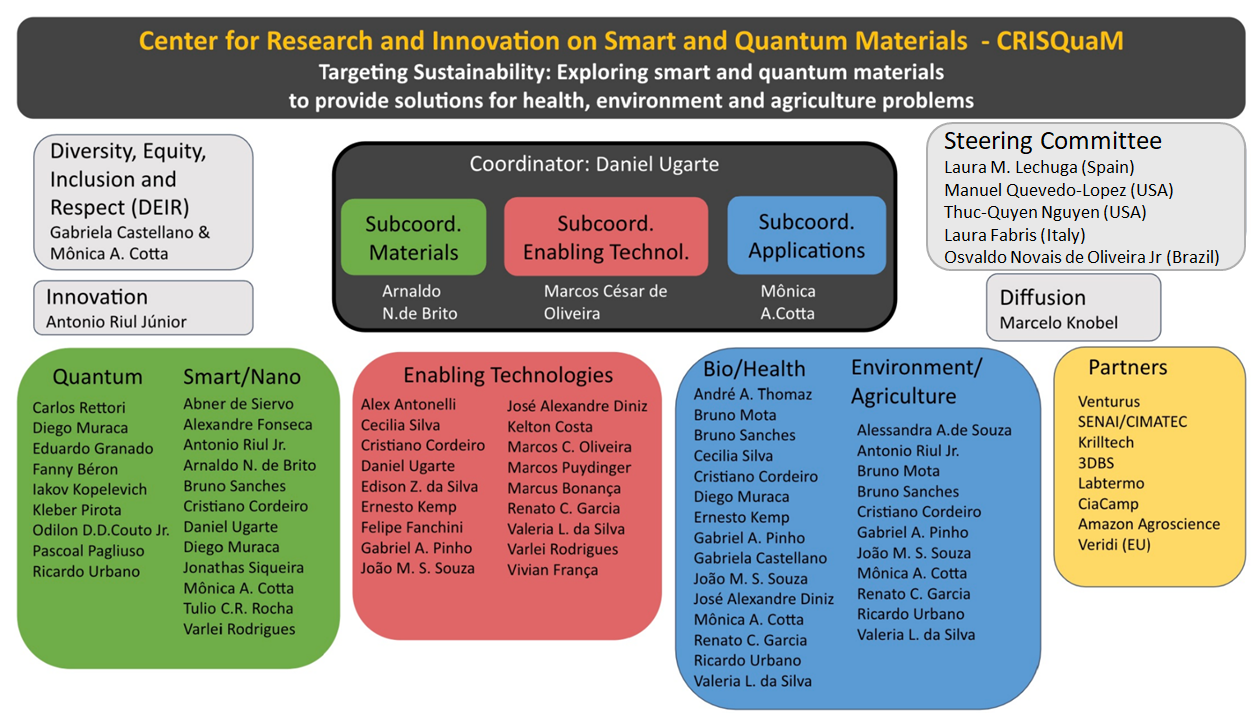BV-FAPESP: research projects supported in this Center
CRISQuaM in the Media: news about the center
CRISQuaM aims to explore the synergistic development of fundamental and applied science to create new materials with high potential for the construction of devices and sensors to address technological challenges related to sustainability, climate change, precision agriculture, ecology, and health. To achieve these goals, we have assembled an interdisciplinary and collaborative research team, integrating expertise across various scientific domains, researching novel materials with high innovation potential. By combining original synthesis methods, advanced characterization techniques, theoretical approaches, computational simulations, quantum technologies, and device construction designs, we aim to drive advances in smart and quantum materials, promoting scientific excellence and technological development. With this, we plan disruptive innovations in instrumentation—including hardware and AI-based tools—as well as in quantum technologies, biomedical devices, and signal processing, in addition to plant bionics, exploring plant-pathogen interactions. Besides research activities, we plan intensive actions in education, dissemination, and communication for the general public, as a modern society should be aware of the challenges humanity faces and how research and technology are essential for responsibly utilizing the planet's limited resources. CRISQuaM's Innovation activities are accelerated through partnerships with several companies in related technologies, many of them Brazilian. Finally, all activities of the Center are managed in accordance with diversity, equity, and inclusion goals and best practices.
The Center brings together scientists, engineers, and innovators in a collaborative effort to apply materials science and quantum technologies at the cutting edge, designing new materials and nano(bio)sensors for advanced diagnostics. The Center has a team capable of producing a wide range of (nano/micro) materials, along with precise chemical and physical characterizations using modern techniques (synchrotron, advanced microscopy, magnetotransport, magnetic resonance, optics, etc.). In addition, the team offers various options in enabling technologies, including miniaturization, processing, and additive manufacturing, as well as instrumentation, quantum sensing, and electronics development. Data analysis will employ updated approaches (numerical simulation, classical and quantum machine learning, and quantum optimization). Applications at the knowledge frontier will address urgent sustainability needs in environmental areas, precision agriculture, plant bionics, and biomedical interfaces, contributing to the development of local technologies in close partnership with the Brazilian industry.
The organization of the Center is based on three pillars — Materials, Enabling Technologies, and Applications — together with partner companies, as described in the figure below.

2025-06-18
Scientists from the Curie Institute and the University of São Paulo are about to conduct a clinical study to evaluate the safety and efficacy of a new CAR-T cell-based immunotherapy for patients with oculocerebral lymphoma; the project was presented at FAPESP Week in Toulouse.
2025-06-18
University of São Paulo researchers are developing an aircraft equipped with sensors that can detect and measure the concentrations of carbon dioxide and methane in the environment; the project was presented at FAPESP Week France in Toulouse.
2025-06-17
By combining different techniques, researchers at São Paulo State University in Brazil have revealed biological pathways related to tenderness, fat deposition, and other relevant characteristics of the meat of the predominant cattle breed in Brazil. The results could optimize strategies to enhance product quality and bolster the competitiveness of Brazilian livestock farming.
2025-06-16
The evaluation of predictive models for low birth weight cases was based on data from a population study of over 1,500 pregnant women in the city of Araraquara in the state of São Paulo, Brazil. Early identification of the problem is crucial for effective intervention.
2025-06-16
Over the course of three years, researchers from the University of São Paulo and their collaborators examined the “belief in a just world” of 659 São Paulo residents between the ages of 12 and 14. The results highlight the importance of incorporating urban and structural factors, such as access to services and community cohesion, into discussions on citizenship and democratic development.
2025-06-16
Researchers have found a substance in propolis from bees native to Brazil that kills 90% to 100% of Aedes aegypti larvae. The compound, found in pine sap, is likely enhanced by insect processing and has the potential to help combat mosquitoes that transmit arboviruses.